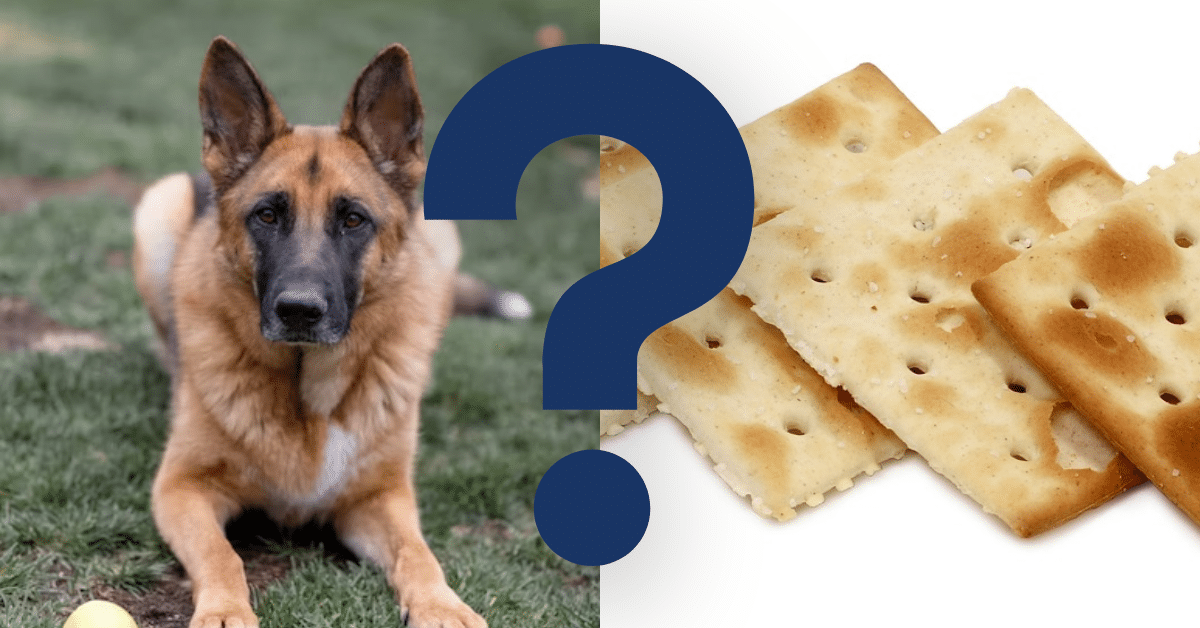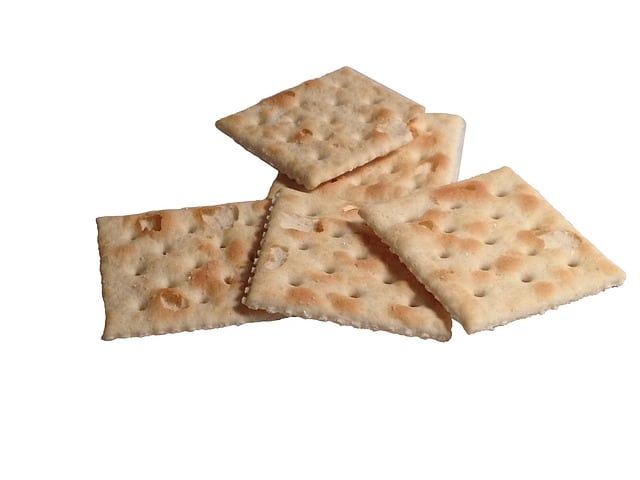Can Dogs Eat Saltine Crackers? A Vet’s Opinion

Saltine crackers are thin, crunchy, square-shaped crackers that are widely used as a snack or as an addition to soups. But can you feed saltine crackers to your dog?
Feeding saltine crackers to dogs regularly is not suggested since they contain high quantities of sodium and may cause health problems such as dehydration or sodium toxicity. Small amounts may not be detrimental occasionally, but a balanced and adequate diet for dogs is critical to their well-being. It is best to contact a veterinarian regarding safe and appropriate treats for your pet. Prioritizing dog-specific treats will ensure they get the necessary nutrients without jeopardizing their health.
Benefits of saltine crackers for dogs
Saltine crackers do not provide any nutritional value to dogs. They are mostly made of processed wheat flour and salt and are deficient in vital nutrients that dogs require. While a little, infrequent piece may not damage most dogs, remember that canines have different dietary needs than humans. Instead of saltine crackers, give your dog appropriate dog treats or carefully created food to meet their nutritional needs and improve overall wellness. Always consult a veterinarian to decide the optimum diet for your pet.

How to safely give saltine crackers to dogs
While saltine crackers should not be given to your dog regularly due to their high sodium content and lack of critical nutrients, they can be given as a treat occasionally. Remember to check with your veterinarian first to confirm that your dog’s health and nutritional needs allow for such goodies.
Feed In Moderation
Moderation is the key to safely feeding saltine crackers to dogs. Even if your veterinarian approves, give them a tiny slice or two as a treat, not as a regular component of their diet.
Serve Pain And Unsalted
If you give your dog saltine crackers, ensure they are simple and unsalted. Excess sodium intake from salted or flavored crackers might be detrimental to dogs.
Monitor For Adverse Reactions
.
Watch for negative responses or stomach concerns when feeding your dog a new treat. If you experience issues like vomiting or diarrhea, stop eating the crackers immediately and consult a veterinarian.
Size Matters
Break the cracker into tiny pieces to avoid choking concerns, especially for little breeds. Always keep an eye on your dog while they are eating the crackers.
Toppings Should Be Avoided
Do not serve saltine crackers with toppings like cheese, spreads, or other human food products. Some toppings may be toxic to dogs.
Take Into Account Dietary Considerations
Consider your dog’s total diet as well as any existing health conditions. Saltine crackers may be unsuitable for your dog if they are overweight or have special dietary requirements.
Replace Saltine Crackers With Dog-Friendly Goodies
Instead of saltine crackers, choose dog-friendly treats created exclusively for canine ingestion. These snacks are designed to meet their dietary requirements, including no hazardous substances.
Homemade Alternatives
If you want dog treats, several dog-friendly recipes online employ safe ingredients like whole wheat flour, peanut butter, or pumpkin puree.
Training Tool
If you prefer saltine crackers during workouts, use them sparingly and consider healthier alternatives such as small pieces of cooked chicken or carrot sticks.
Consult Your Vet
Always talk with your veterinarian before changing your dog’s diet or treat alternatives to ensure your decisions support their health and well-being.
While sharing treats with your dog can be a fun bonding experience, remember that their primary nourishment should come from a balanced and complete dog food diet. Treats, such as saltine crackers, should be used to supplement rather than replace their regular meals.
Will saltine crackers make a dog sick?
Saltine crackers can make a dog sick if eaten in significant numbers or if the dog has specific health issues. Here are some of the problems that saltine crackers may create in dogs:
Excess Sodium
Saltine crackers are heavy in sodium, which can cause sodium poisoning if ingested in significant quantities. Excess sodium consumption can lead to dehydration, electrolyte imbalances, and other health problems.
Upset Stomach
Some dogs may have difficulty digesting the refined wheat flour used in saltine crackers, resulting in an upset stomach, vomiting, or diarrhea.
Choking Hazard
If the crackers aren’t broken up into smaller pieces, they can become a choking hazard, especially for small breed dogs or those who eat quickly.
Unbalanced Nutrition
Saltine crackers lack critical nutrients that dogs require in their diet. Feeding them to your dog regularly can lead to nutritional imbalances over time.
Allergies
Some aspects of saltine crackers, such as wheat, may trigger allergic reactions in particular dogs, such as itching, skin problems, or gastrointestinal disorders.
Pancreatitis
High-fat snacks, such as saltine crackers, can cause pancreatitis in some dogs, particularly those with a history of pancreas-related health issues.
Weight Gain
Saltine crackers’ high carbohydrate content can contribute to dog weight gain if given too regularly or in large quantities.
Increased Thirst And Urination
Due to the high salt content in saltine crackers, dogs may drink more water and urinate more frequently, perhaps leading to house-training issues.
It’s important to remember that each dog is unique, and some dogs may accept modest amounts of saltine crackers better than others. However, it’s better to avoid giving dogs saltine crackers and instead give them dog-friendly treats designed to satisfy their unique nutritional needs. If you suspect your dog has eaten many saltine crackers or is struggling, contact your veterinarian immediately.
Can dogs eat saltine crackers variations?
Dogs should not swallow any saltine cracker variations. Saltine crackers are not suited for dogs due to their high sodium level and lack of critical nutrients, regardless of whether they are flavored, manufactured with various ingredients, or have unusual toppings.
- Other Crackers
While some crackers, such as whole-grain or unsalted versions, may have fewer toxic components, they are still inappropriate dog treats. While a tiny amount may not cause immediate harm, they do not provide significant health benefits and should not be included in a dog’s food regularly.
- Homemade Dog Treats
Making homemade dog treats out of saltine crackers is typically not suggested. Instead, make dog-specific treats with safe and nutritious ingredients for canines.
- Saltine Crackers in Commercial Dog Treats
Commercial dog treats containing saltine crackers are rare, as ethical pet treat makers prioritize safe and nutritious ingredients for dogs.
While dogs may accept small amounts of saltine crackers without immediate harm, they provide no meaningful nutritional benefits. They may cause health problems if served on a regular or large scale. It’s usually preferable to choose treats specifically designed for dogs, focusing on their dietary needs and overall well-being. If you’re ever wondering whether a particular dessert or dish is safe for your dog, consult your vet.

Vet’s Summary
While dogs may occasionally tolerate modest amounts of saltine crackers, they are not suggested as a frequent treat due to their high sodium content and lack of critical nutrients. If dogs are fed too many crackers, they may develop digestive problems, dehydration, and salt toxicity. Furthermore, certain cracker varieties or toppings can be toxic to dogs. Instead, the article recommends that dog owners choose dog-specific snacks that fit their nutritional needs and check with a veterinarian for appropriate treatment selections.
Consider adding probiotic supplements to your dog’s food to improve their digestive health and overall well-being. Probiotics can help to maintain healthy gut flora, ease digestion, and boost the immune system. These supplements can be especially effective if your dog has had digestive issues or is transitioning to a new diet. Consult your veterinarian to choose the best probiotic supplement for your dog’s age, breed, and special health requirements. When combined with a balanced and proper diet, probiotic pills can help your pet live a happy and healthy life.
Videos to watch
If you are wondering if you can give your dog saltine crackers, watch this:
And if you want to know what a dog can NOT eat, watch this:






